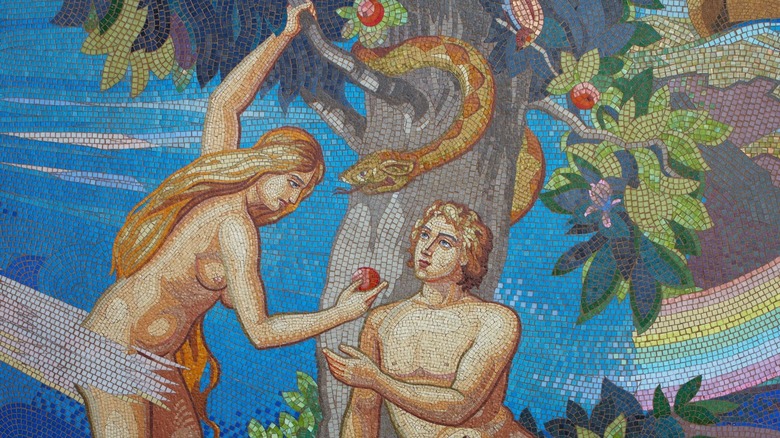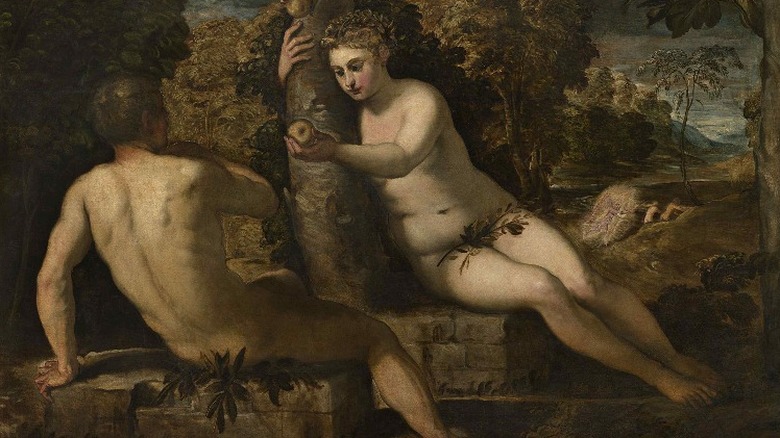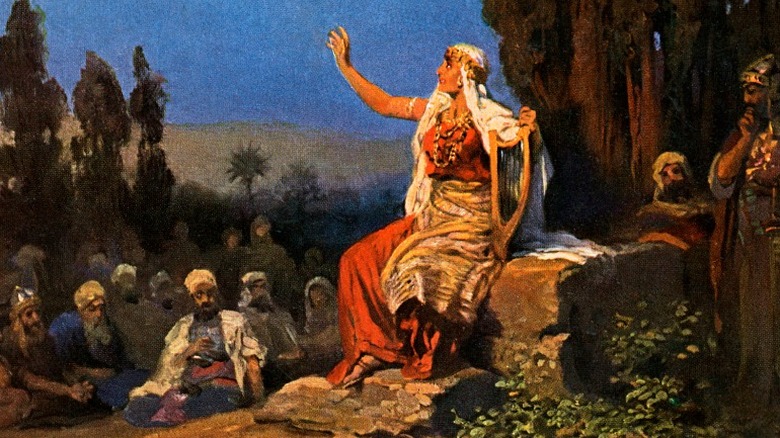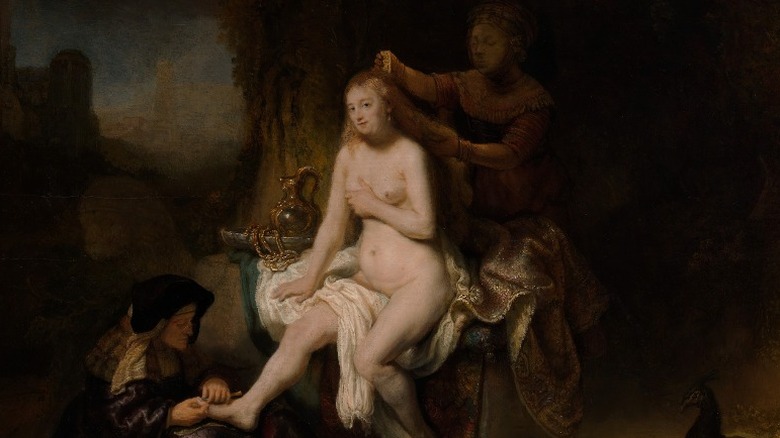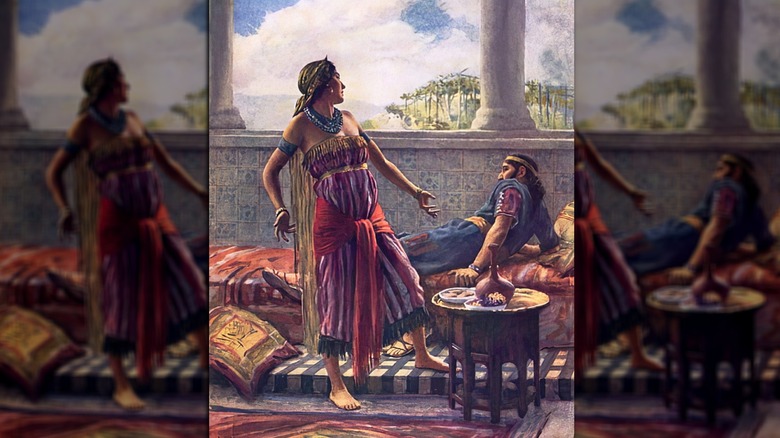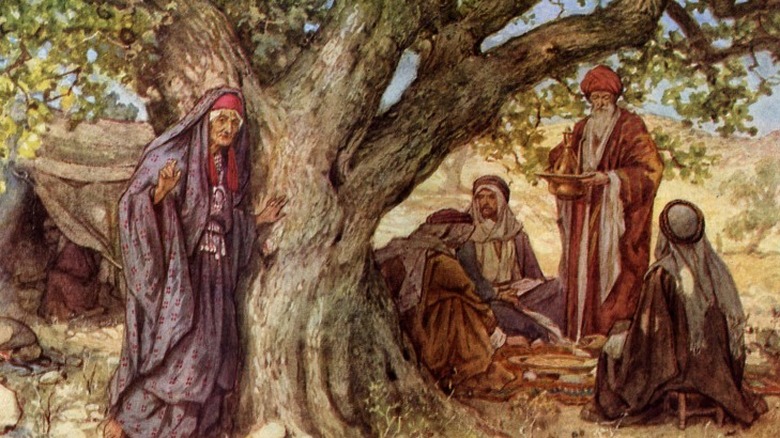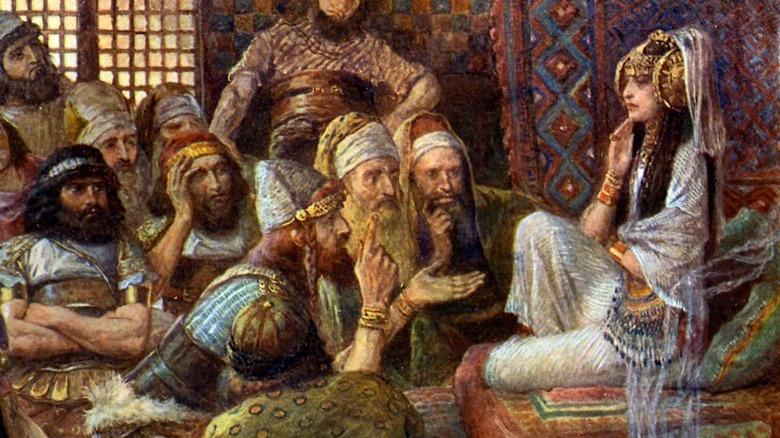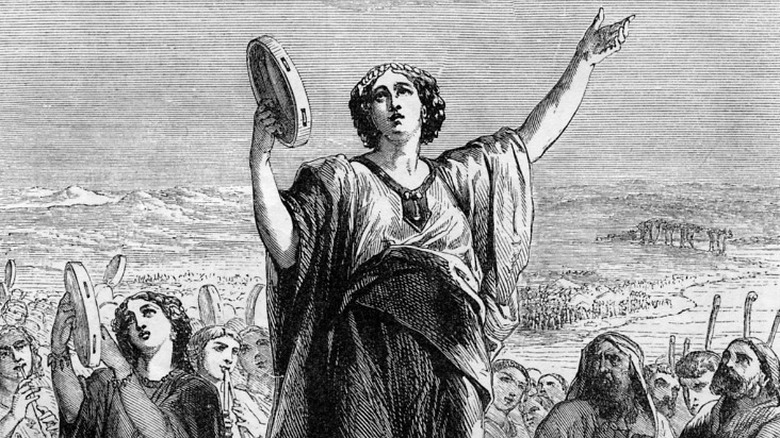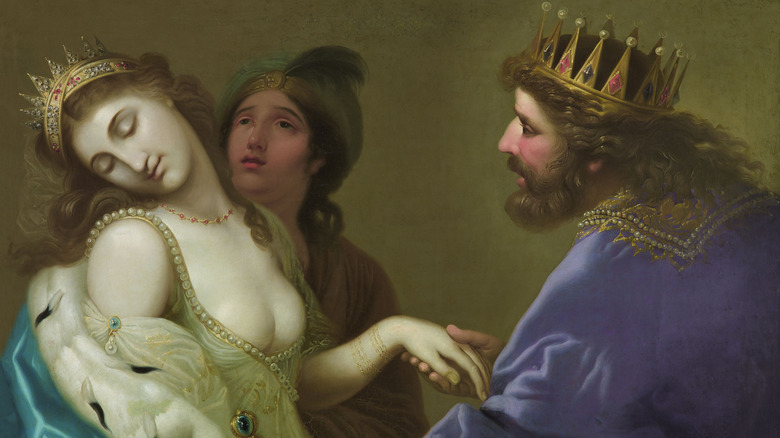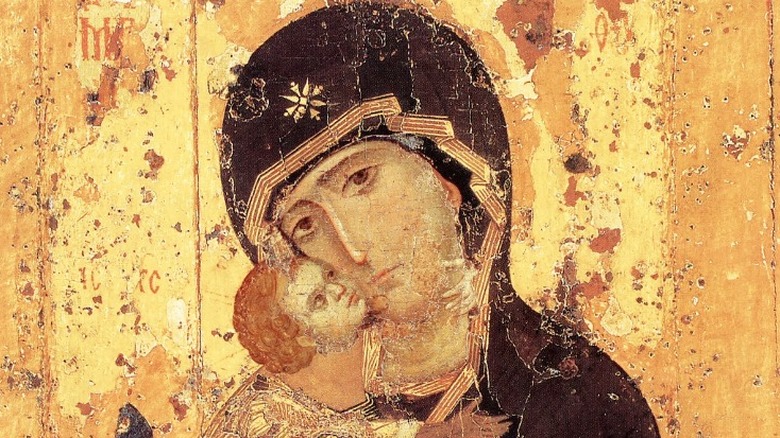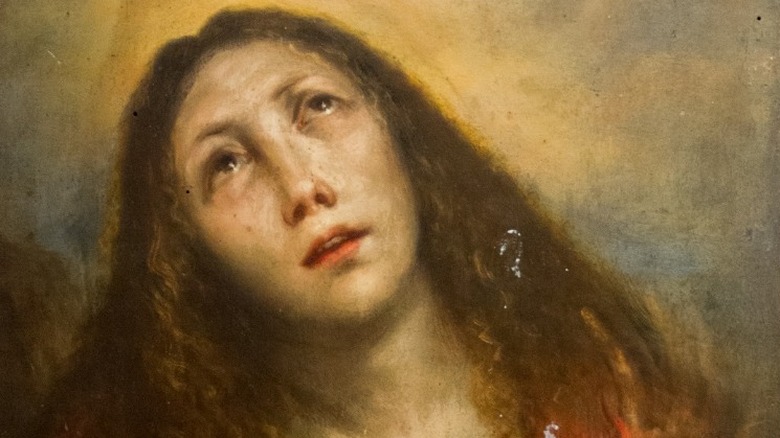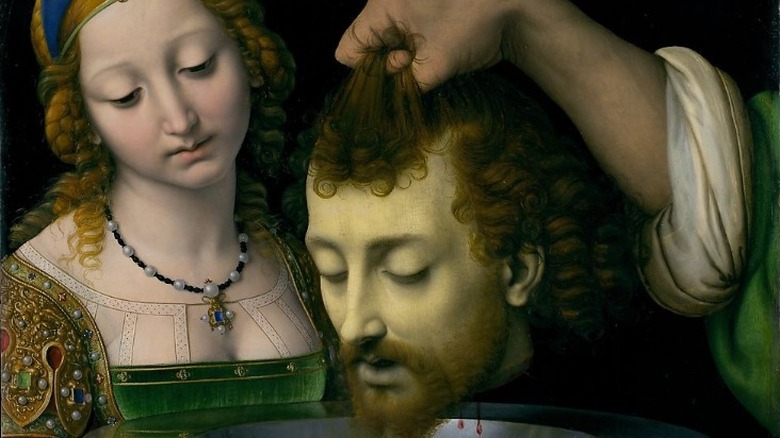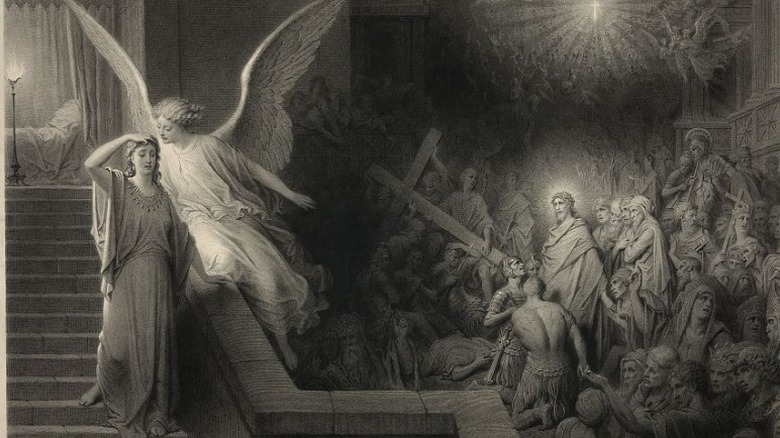Most Impactful Women Of The Bible
The Bible has over 700,000 words, give or take, with the exact count depending on which translation you're looking at, as per The Bible Answer. Yet only 14,056 of those words are spoken by women, according to a meticulous study of the New Revised Standard Version by Rev. Lindsay Hardin Freeman and her team of researchers. "We have for whatever reason overlooked the witness of women in the Bible for all these thousands of years and all the contributions they've made to the faith and to world history," Freeman told The Huffington Post.
Throughout the Bible, women have experienced enormous injustice. A common theme in the Bible is the association of women with weakness, temptation, and sin as opposed to the many virtuous depictions of biblical men as honorable leaders. Biblical women are often depicted as guilty just for being women.
However, there are also women in the Bible who are taken seriously and represented as rational, boisterous, important, and impactful. Both the oppressed women and the celebrated ones have had major societal implications since their stories were written. The representation of women in the Old Testament and the New Testament has significantly influenced the Judeo-Christian faith, as well as the societal expectations of women across the world. Moreover, the many impactful women in the Bible have inspired and championed women across the ages to be dignified, assertive, and self-assured in an intimidating patriarchal society.
Eve
In Genesis 3, Eve eats the forbidden fruit from the Tree of Knowledge in the Garden of Eden. Because of this single act, women throughout history have had to live with the consequences of the first woman's curiosity and foolishness, according to the Biblical Archaeology Society. After Eve eats the fruit and tricks Adam into eating it, she and her husband become aware of their nakedness, are banished from the garden, and pass original sin onto humanity. Consequently, Eve's initial sin cursed future populations, and she is held accountable for humanity's susceptibility to pain, disease, aging, and lust, according to Marina Warner in "The Bible: A History" (via YouTube). Even the fourth century theologian, St. Augustine, equated Eve with evil and played a major role in Western Christianity's negative view of women and sexuality.
For thousands of years, Eve has been blamed for humanity's miseries specifically related to the pain of childbirth. "I will make your pains in childbearing very severe; with painful labor you will give birth to children," according to Genesis 3:16. Essentially, humans are susceptible to suffering because of Eve's corrupt actions. Eve's naivety in the Garden of Eden supports society's representation of women as weak, while her influence over Adam to eat the forbidden fruit represents her as a temptress and irresponsible.
Deborah
Deborah was a prophetess and orator in the Old Testament. Her speeches inspired the Israelites in their defeat over the Canaanite authorities who took over the Promised Land, now Palestine, according to Britannica. Recognized as the Judge of Israel, she greatly impacted her people by settling disputes, offering advice, and providing military counsel to the Israelites. As Rabbi Marcia Plumb notes, Deborah was more of a trusted spiritual counselor as opposed to an actual legal judge.
According to the Jewish Women's Archive, Deborah is biblically interpreted as the embodiment of a trusted leader. However, the lack of evidence of the events that take place around her suggests that she isn't actually a historical figure. Moreover, Deborah is often interpreted as a symbol of maternal protection over the Israelites in battle, even calling herself "mother in Israel" (Judges 5:7) However, historian Bettany Hughes insists that Deborah represented the many heroic women who fought for Israel during that time.
A charming leader, Deborah orders Barak to lead the war against the Canaanites in Judges 4:6, but he'll only go if Deborah joins him in battle, suggesting the major influential power and respect that people had for her. According to the Jewish Woman's Archive, while Deborah is recognized as a prophet, eventually, rabbis were uncomfortable with the military leadership of a woman and belittled her influence as a judge by poking fun at the "Song of Deborah" — which describes her victory — as arrogant and conceited.
Bathsheba
The story of Bathsheba begins in the Book of Samuel and has such major consequences that it continues to the Book of Kings. What starts off as male lust ends up being one of the most climactic narratives in the Bible. As the story goes, King David of Israel becomes infatuated with Bathsheba, who he sees bathing herself outside and demands to meet her (via Britannica). Which begs the question — does the sight of this naked woman give this man the right to her body? As noted by historian Bettany Hughes, it's a "moral dilemma lurking in this story ... an issue that still affects us today." So, while some interpretations of the Bible view Bathsheba as the seducer, many scholars argue that bathing outside was an innocent act and not that uncommon in ancient Israel.
As described in 2 Samuel 11:4, "David sent messengers to get her. She came to him, and he slept with her." Some historians assert that Bathsheba was put in a difficult position as a married woman having been summoned by the king, and that she isn't the seducer but, instead, she is the one who is "sinned against." Eventually, Bathsheba discovers that she's pregnant with King David's baby, so he orders Bathsheba's husband to be killed and then marries her. Consequently, God was angry over these sinful events, and the new couple lose their conceived son. However, later, Bathsheba gives birth to Solomon, who would become the next king of Israel, making Bathsheba the mother of Solomon's bloodline.
Jezebel
Jezebel appears in the Bible in the Book of Kings and is portrayed as wicked, notes Britannica. Her name today is often synonymous with someone who is devious and controlling. She was a Phoenician princess who married Ahab, the king of Israel, but continued to worship her own pagan gods even after she married, according to Rabbi Marcia Plumb. Moreover, Jezebel was an impactful queen as she proved to be successful at persuading her husband toward her pagan belief system. In the Bible, her husband is notably portrayed as weak, while Jezebel is depicted as assertive and decisive. "Is this how you act as king over Israel? Get up and eat! Cheer up," she says in 1 Kings 21:7.
Jezebel's devotion to her pagan beliefs angered her Jewish subjects, and she was considered an enemy, details Biography. However, she can also be interpreted as a symbol of patriotic devotion in her attempt to defend her identity as a pagan princess, as per the Biblical Archaeology Society. Her story is written from the perspective of Christians, but if her story was written by her own native people, it might be a much different story — applauding her commitment to her own religious beliefs.
According to Parable, Jezebel is the story of what a woman can be if she is given power. However, her attempt to influence the Jews into worshipping her own god, Baal, ended when she was thrown out of a window — her body dismembered and unrecognizable.
Sarah
Sarah (originally Sarai) is credited as the "mother of nations' (Genesis 17:15). Married to Abraham, Sarah is unable to conceive children for most of her life and orders Hagar, her Egyptian handmaiden, to be a surrogate to birth a son for her and Abraham since Israel's ancestry was in jeopardy. However, things don't go according to plan, and Hagar no longer sees Sarah as superior causing Sarah to now see Hagar as a threat, according to the Jewish Women's Archive. Hagar eventually gives birth to Ishmael, but God informs Abraham that Ishmael will have his own path in life and that God's covenant will be delivered through Sarah.
Subsequently, at 90 years old, Sarah gives birth to Isaac. Although she ironically disappears from Genesis after her job is done, Sarah is still largely celebrated as the ancestress of the Jewish people. Considered the second father of Israel, her son, Isaac, is credited as one of the most influential patriarchs of the Jewish community — the father of Jacob who's 12 sons would eventually lead the 12 tribes of Israel, according to Britannica.
Delilah
Delilah is an influential figure in the Bible, depicted as a devious woman who uses her sexual charms to seduce bad-boy Samson. She first appears in Judges 16:4 and is widely regarded as a manipulating temptress. According to the Book of Judges, the Philistines wanted to destroy Samson and rid him of his divine strength, so they offered Delilah silver to help with their plan. Knowing that he had promised God never to cut his hair, Delilah went after Samson's weakness and shaved his head.
Essentially, Delilah becomes known as the ultimate temptress and one of the many women in the Hebrew scriptures that gets categorized as a sex worker. However, the scriptures never actually name her as such, but as time goes on, readers of the Bible interpret her as exactly that. Instead, Delilah is a foreigner and a threat to Israel, portrayed as a catalyst in breaking faith with ideals, writes Herbert Lockyear in "All the Women of the Bible" (via Bible Gateway). Once she cut Samson's hair, Delilah became one of the most notorious women in the Bible, adding to the narrative of biblical women as promiscuous and wicked, and even as a "political tool."
The story of Delilah is the story of power struggle between the Israelites and the Philistines, and she becomes the symbol of the enemy, according to Parable. Fundamentally, Delilah is impactful because she becomes a lesson to women on how to behave, while warning men of the spell that a woman can put on them.
Miriam
Miriam appears as one of the very few prophetess in the Bible. She is the older sister of Moses, who was born in Egypt during the slavery and oppression of Jewish people, according to the Jewish Women's Archive. Miriam is noted in the Bible as leading the way with singing and dancing for the women who crossed the Red Sea, as described in Exodus 15:20. She represents leadership and becomes the archetype of which all other female prophets are inspired. Miriam shows her assertiveness when she challenges how the message of God can only be interpreted through Moses, saying, "Has the Lord spoken only through Moses? Has he not spoken through us also?" (via Numbers 12:2). Through her actions, she later is recognized as an equal in "representing God before the people," thus perhaps foreshadowing the idea that men and women should be equal, and everyone should be able to embrace their voices. However, her strong will comes with a price, and she is punished by God for speaking up.
But her story doesn't end there. Miriam impacted her people by providing reassurance and support for Jewish nomads as they left Egypt. In the Bible, she shows immense concern for her fellow Jews and because of this, the same concern is returned to her by her people when she becomes ill as a punishment from God. After being confined outside the camp for seven days, her people refuse to continue their journey until she returns — despite God and Moses' instructions (via Numbers 12:15).
Esther
Esther's journey begins as a young Jewish woman who becomes queen and endangers her life to save her fellow Jews from annihilation. Her impactful story can be seen as a fight for Jewish identity. An order had been given to wipe out the Jews in the kingdom of King Ahasuerus, but Esther comes up with a plan to persuade her husband to cancel those plans, according to Britannica.
Esther first appears in the Bible as a young virgin in the king's harem, and he is so taken with her, he makes her queen, her Jewish identity still a secret (via Esther 2:10). As a tactful negotiator, Esther plans to convince the king to spare the Jews from execution. "I will go to the king, though it is against the law; and if I perish, I perish" (via Esther 4:16). Because of these efforts, Esther is celebrated as a "woman of action," according to the Jewish Women's Archive.
Subsequently, she reveals her true identity and blames the annihilation of the Jews on the king's advisor. In due course, the Jews are granted authority to protect themselves from the enemy, which they do with great victory (Esther 7–9). The story of Esther is impactful because it can teach Jews to "take matters into their own hands" rather than waiting for God to change the situation.
Mary
As the Mother of Christ, the Virgin Mary is infamously noted as the most celebrated female figure in Christianity. According to Bettany Hughes, she became a global phenomenon for her divine qualities and is the female archetype for what Christian dogma expects of women — to be pure, obedient, and graceful.
As the matriarch of Christianity, the Virgin Mary inspires an entire movement known as the virgin cult that grew exponentially in western Europe in the 12th and 13th centuries, according to The Met. This growing cult of an ever-virgin status put a major emphasis on celibacy that instigated a ripple effect that can be found in modern-day convents for nuns. Essentially, the veiled figure of this virgin woman is an example of pure "female virtue" that women are often compared to, according to Marina Warner.
Identified as the mother of Jesus, Mary eventually became known as the mother of God. Not only was she a symbol of spiritual power, she is also revered as actual physical power, according to Bettany Hughes. She was used during wars as a protective force with portraits of her face being hung from citadels during sieges or held up during battles as a sort of divine barrier. Therefore, Mary was not only the mother of God but also the mother and "shield" of humanity.
Mary Magdalene
Mary Magdalene is by far one of the most impactful women of the Bible. In the modern interpretation, she has unceremoniously been given a bad reputation as a possessor of demons, according to Timeline, and is even described as a sex worker, which History notes was an attempt to "downplay her influence" and importance. However, Mary Magdalene is a symbol of bravery. The other disciples fled the scene of Jesus' execution because they were afraid, but Mary Magdalene stayed with him until his death, according to Mother Catherine of the Convent of Saint Mary Magdalene.
However, among the several mentions of her in the Bible, one of the most interesting citations is of her finding the empty tomb of Jesus after his crucifixion. This single event puts Mary Magdalene in the spotlight as one of the most influential figures in the New Testament, and by some accounts, one of the most influential people in Christianity. According to Timeline, "If Christianity is the belief in Jesus's death and resurrection, and she's the first to say that he got raised from the dead, one can plausibly argue that, in fact, Mary Magdalene started Christianity."
Another important aspect of Mary Magdalene's discovery of Jesus' empty tomb is that the writers of the Bible kept that information in. Even though her words needed to be confirmed by male disciples in Luke 24:10, Mary Magdalene is given the credit in the Bible as the first one to recognize Christ's resurrection.
Salome and the execution of John the Baptist
In the Bible, Salome is considered the instigator in the execution of John the Baptist. Her name isn't mentioned in the Bible, notes Christianity.com, but the first-century historian, Josephus, identifies Salome as a major role in John's death, as per Britannica. Essentially, Salome was involved in a brawl between John, her stepfather, and mother that led to her being the scapegoat in a conniving plot.
According to Gospels Mark 6:14-29 and Matthew 14:1-12, Salome's stepfather, Herod, ruler of Galilee, put John in jail for accusing him and his new wife — Salome's mother — of adultery (she was previously married to his brother). Herod was apprehensive about killing John because he was a popular prophet, so imprisonment was the most suitable form of punishment. One night at a festival, Salome danced for Herod and his guests in what historians consider an early form of lap dance, and as a prize for her performance, Herod promised his stepdaughter whatever she asked for. Salome's mother saw an opportunity to seek revenge against John and convinced her daughter to ask for his head on a platter, and in due course, John's head was brought to Salome.
Salome's story ended up influencing an entire movement of erotic storytelling and art. She is illustrated in renaissance paintings, a 19th-century play by Oscar Wilde, and even an opera. But despite her shameful reputation, Salome was just a young instrument of "sexual bait" for the purpose of adult revenge, notes historian Bettany Hughes.
Pontius Pilate's wife
Pontius Pilate's wife is one of the many unnamed women only identified in the Bible by their relationship to their husbands. She notably impacted her husband's opinion of Christ by trying to sway his decision to have Jesus executed. According to Matthew 27:19, "While Pilate was sitting on the judge's seat, his wife sent him this message: 'Don't have anything to do with that innocent man, for I have suffered a great deal today in a dream because of him.'"
She is impactful to the faith of Christianity because of her empathy toward Jesus and her belief in his innocence. Many members of the Christian faith admire her loyalty to Christ, with Christianity.com even describing her story as a "significance" that should "not be overlooked." Her lasting impression on Christians eventually led to her canonization in the Orthodox Church and is identified today as Saint Claudia Procula.
Although she isn't mentioned a lot in the Bible, the times that she is noted are of pivotal importance. According to Father Steven Ritter of Ancient Faith Radio, early church writers indicate that she and her husband converted to Christianity, which suggests the somewhat powerful influence that she had over her Roman husband. One could argue that she brought out a remorseful side to the influential Roman politician as he famously removed himself from the decision to have Jesus killed: "I am innocent of this man's blood ... It is your responsibility!" (Matthew 27:24).
